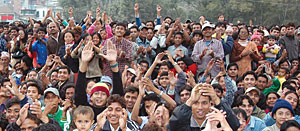 |
The royal regime ended on 24 April 2006 and the House of Representatives was reinstated, following the people's movement. On that day, the Maoists entered mainstream politics, which paved way for the Constituent Assembly (CA) elections. The subsequent political developments that led to the declaration of Nepal as a secular republic hold a deep significance in the country's history. The epochal changes that the nation witnessed that day continue to inspire us as we celebrate Loktantra Day every 24 April, and remind us that the significance of the day lies in its immortalisation of an empowered people who changed the course of history.
But the political parties that fought hand-in-hand and led the nation through those times of great change are now pitted against the other. Has something changed in them, or have they shunned the people's aspirations for greater changes? One does not need to be a political expert to see a clear polarisation among the parties, evident in the politicisation of the Loktantra Day celebrations in Kathmandu. The parties issued statements of good wishes, but they were empty words. The day was observed in an environment of disappointment. The very parties that combined forces until the CA was formed are now divided on whether to retain or dismantle it. There is conflict even within parties on the issue.
No party is stable right now but within each party there exists a strong determination to uphold the integrity of the CA. On this Loktantra Day, let us hope that the political parties will do justice to our historical achievements and to the assembly that institutionalized these achievements.


